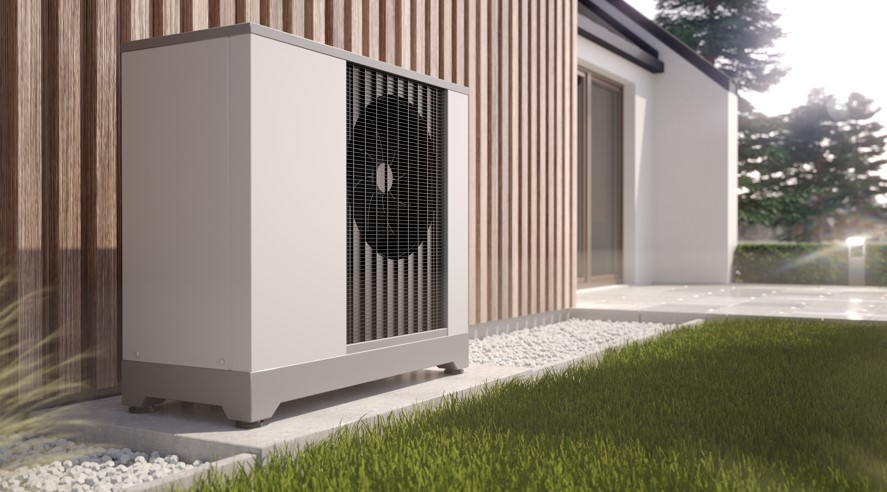Why Phoenix Homeowners Should Consider Dual-Fuel Heat Pumps

A dual-fuel heat pump is essentially a hybrid heating system that combines the best of two worlds: an electric heat pump and a gas furnace.
Now, you might be asking, why both? The answer lies in the unique way they complement each other to give you the most efficient heating solution.
Understanding Heat Pumps
Heat pumps are, quite simply, devices that move heat from one place to another. This is a great solution for home heating and cooling because they can both heat your home during cooler months and cool it during warmer months.
They work on the principle of heat transfer rather than generating heat, which is what makes them such an efficient choice for temperature control in homes.
Heat pumps move heat by using a refrigerant, which alternately evaporates and condenses to absorb and release heat.
The direction of heat flow can be reversed, which is how the same system can both heat and cool your home. So, instead of burning fuel to create heat, like a traditional furnace, heat pumps use electricity to simply move heat.
How Dual-Fuel Heat Pumps Work
In a dual-fuel heat pump setup, the main workhorse for most of the year is the electric heat pump. This system operates in much the same way as a standard heat pump, providing both heating in the colder months and cooling in the warmer months.
It does this by efficiently transferring heat from one location to another rather than generating it. The electric heat pump uses less energy than traditional heating systems, making it a more cost-effective and environmentally friendly option for maintaining comfort levels in your home.
However, while an electric heat pump is energy efficient, its efficiency can decrease when the temperature drops significantly. This is when the dual-fuel system shows its true value.
The dual-fuel system monitors the outside temperature and knows when switching from using the electric heat pump to the gas furnace is more efficient.
When the temperature dips to a pre-determined point, often around freezing, the dual-fuel system automatically switches over to the gas furnace for heating.
The gas furnace provides reliable, consistent heat, regardless of how cold it gets outside. While it may use more energy than the electric heat pump, it’s more effective at warming your home in extremely cold weather, so it’s used only when necessary.
This balance of resources, intelligently switching between the electric heat pump and the gas furnace, ensures maximum efficiency and comfort, making the dual-fuel heat pump a versatile and smart choice for Phoenix homeowners.
Advantages of Dual-Fuel Heating Systems
Some of the key advantages of dual-fuel heat pumps include:
Efficiency and Cost-effectiveness
Dual-fuel heat pumps are pretty much a superhero in this regard. They’re built to save energy, and as we all know, less energy usage means more money in your pocket.
The genius of the dual-fuel system is how it switches between the electric heat pump and the gas furnace based on the temperature outside.
When it’s milder, the heat pump is more than enough to keep you toasty. But when Jack Frost really starts nipping at your nose, the system switches to the gas furnace, ensuring you’re using the most efficient heating source at all times.
This smart tech can lead to significant savings on your utility bills over time.
Flexibility and Adaptability
If you’ve lived in Phoenix for any amount of time, you know our weather can be a bit… well, unpredictable. That’s where the adaptability of dual-fuel heat pumps comes in handy.
This system can handle anything Mother Nature throws at it, effortlessly adjusting to varying temperatures.
Whether it’s a pleasantly warm winter day or a teeth-chattering cold night, the dual-fuel heat pump system is always ready to deliver optimal comfort.
It’s like your personal climate control system, ensuring your home stays just the right temperature no matter what’s going on outside.
Environmental Benefits
We all know it’s crucial to do our part to help the planet, and choosing a dual-fuel heat pump is one way to do just that.
Because these systems use less energy overall, they also reduce your carbon footprint. That means you’re contributing less to those pesky greenhouse gases that are causing problems for our planet.
Plus, many dual-fuel heat pumps meet or even exceed energy efficiency regulations, which means you can feel good about making a choice that’s not just great for you, but for the earth too.
Disadvantages of Dual-Fuel Heating Systems
Like all things in life, there are trade-offs. So while dual-fuel heat pumps have many benefits, they also have a few drawbacks, and these include:
Upfront Costs
The first thing that might make you raise an eyebrow is the upfront cost. Installing a dual-fuel heating system isn’t exactly cheap.
You’re essentially installing two heating systems – a heat pump and a gas furnace – so your initial investment is going to be higher compared to traditional single-source systems.
But while you’ll pay more upfront, it’s worth remembering that the long-term energy savings can offset these costs over time.
Installation Complexity
Dual-fuel heat pumps aren’t plug-and-play systems. They require professional installation and the integration of two distinct heating technologies.
If your Phoenix home doesn’t already have the necessary infrastructure, such as a natural gas supply and ductwork, additional installation steps might be required, which could add to the cost and time needed to get your system up and running.
Maintenance
Just like any other system in your home, dual-fuel heating systems need to be maintained to keep them running smoothly.
And because you’re dealing with two heating systems instead of one, you might end up with slightly higher maintenance requirements.
Regular servicing by a professional is key to ensure both your heat pump and furnace continue to work efficiently.
Dependence on Fuel Prices
Remember that part of your system relies on gas to heat your home. This means you’re subject to fluctuations in gas prices. If gas prices skyrocket, the cost of running your furnace could go up. However, you’ve still got your heat pump as a highly efficient option when the temperatures allow for it.
Despite these potential drawbacks, many Phoenix homeowners find that the benefits of dual-fuel heating systems outweigh the negatives.
Like with any investment, it’s all about weighing up the pros and cons and deciding what’s best for your specific situation.
Considerations when Installing Dual-Fuel Heat Pumps
Before you make the decision to install a dual-fuel heat pump in your Phoenix home, here are some things you should consider.
Climate
The climate in your area is a crucial factor. Dual-fuel heat pump systems shine in regions where there’s a considerable fluctuation in temperatures throughout the year.
If your area has hot summers and cold winters, like Phoenix, a dual-fuel system could be a perfect match. On the other hand, if you live somewhere with a mild climate year-round, a traditional heat pump might suffice.
Existing Infrastructure
Does your home have access to natural gas? Is the ductwork in your house in good condition?
A dual-fuel system requires both an electric heat pump and a gas furnace. If your home doesn’t already have access to natural gas, you’ll need to arrange this, which could add to the cost and complexity of the installation.
Upfront Costs and Long-Term Savings
While a dual-fuel system can offer significant energy savings in the long run, the upfront costs can be higher compared to a traditional heating system. These systems combine two distinct heating technologies, which require more complex installation.
However, if your climate is a good fit for a dual-fuel system, the increase in energy efficiency could lead to substantial savings on your utility bills over time, offsetting the initial investment.
Professional Installation and Maintenance
A dual-fuel system is not a DIY project. It requires professional installation and regular maintenance to ensure optimal operation and longevity.
When considering installation, you’ll need to factor in the cost of hiring a professional. Also, it’s worth noting that maintaining two systems might involve slightly higher maintenance costs over the life of the system.
Size and Space
Because a dual-fuel system involves both a heat pump and a furnace, you’ll need to consider the space available in your home.
The system should be appropriately sized to ensure it can heat and cool your home effectively. A professional can help determine the correct size based on the square footage of your home, its insulation, and other factors.
Conclusion
Dual-fuel heat pumps are a great option for Phoenix homeowners who want an energy-efficient and cost-effective way to heat and cool their homes.
By combining the efficiency of an electric heat pump with the reliability of a gas furnace, dual-fuel heat pumps can provide consistent and comfortable temperatures year-round, even in extreme weather conditions.
They are also more energy-efficient than traditional HVAC systems and can help homeowners save money on their energy bills.
Additionally, dual-fuel heat pumps are easy to install and require less maintenance than traditional HVAC systems, which can save homeowners time and money in the long run.
